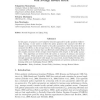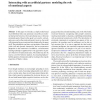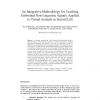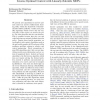575 search results - page 64 / 115 » Reinforcement Learning State Estimator |
138
click to vote
JMLR
2010
14 years 7 months ago
2010
In this paper, we propose a novel adaptive step-size approach for policy gradient reinforcement learning. A new metric is defined for policy gradients that measures the effect of ...
131
Voted
ICML
2000
IEEE
16 years 1 months ago
2000
IEEE
Eligibility traces have been shown to speed reinforcement learning, to make it more robust to hidden states, and to provide a link between Monte Carlo and temporal-difference meth...
101
click to vote
BC
2008
15 years 18 days ago
2008
In this paper we introduce a simple model based on probabilistic finite state automata to describe an emotional interaction between a robot and a human user, or between simulated a...
99
Voted
AGI
2008
15 years 1 months ago
2008
A teaching methodology called Imitative-Reinforcement-Corrective (IRC) learning is described, and proposed as a general approach for teaching embodied non-linguistic AGI systems. I...
108
Voted
ICML
2010
IEEE
15 years 1 months ago
2010
IEEE
We present new algorithms for inverse optimal control (or inverse reinforcement learning, IRL) within the framework of linearlysolvable MDPs (LMDPs). Unlike most prior IRL algorit...




